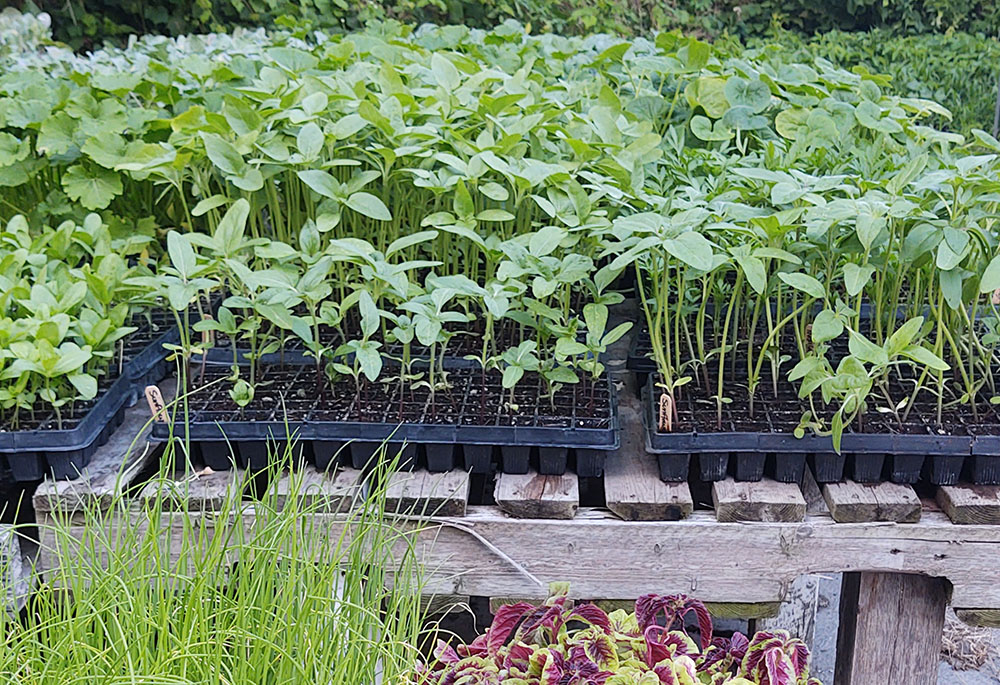
Seedlings are grown to be planted in the fields for the Three Sisters Garden Project, whose mission is to make locally grown food available to all. The project farms on the land of the Sisters of Notre Dame de Namur in Ipswich, Massachusetts. (Eileen Burns)
This is a story of land, its history in Ipswich, Massachusetts, and its relationship to the Sisters of Notre Dame de Namur, in the spirit of "Laudato Si', on Care for Our Common Home" — long before that document was written.
The Native Americans who first lived in Ipswich were Pawtucket (also called Pennacook) from northern New England. They named the land "Aga" meaning "beyond" or "other side of" and "wam" meaning "the marsh." So "Agawam." They lived here long before the English arrived in the early 1600s.
Our own relationship as Sisters of Notre Dame de Namur with this beautiful land began in 1959. At that time there was a villa, a dairy barn and a carriage house on the property. On July 4, 1961, we opened our residence, an art studio, administrative offices and our novitiate for the formation of young women discerning their calling to Notre Dame de Namur. We now have Notre Dame Spirituality Center, a home for our retired sisters, and province and international offices in the main building, and the Cuvilly Arts and Earth Center at the former dairy barn.
We are the stewards of 171.85 acres on this land: 80.3 acres classified as net usable land area, or NULA, and 53.2 acres as wetlands and water. Another geological characteristic of this land are the rolling, elongated hills or drumlins — the Irish word for "littlest ridge," a gift from the ice age artistically carved by glaciers. There are three distinct watersheds on the property which include brooks, ponds (both freshwater and brackish), natural springs, wetlands and marsh.
We are aware that we have coinhabited this land for about 62 years with many species of plants and animals and we have tried to be good stewards and earth tenders. The lawns, old fields, (some of which are currently farmed through our partnership with the Three Sisters Garden Project) forests, salt marsh, ponds and fresh water form a mosaic of habitats for a rich diversity of wild life of both plant and animal species. There are some unique bordering ecosystems such as forest and fields, which are home to rarer species.
From the beginning, we have used the former dairy barn to build relationships with the people of Ipswich. Initially it was a reading and tutoring center and then evolved into the Cuvilly Arts and Earth Center more than 38 years ago. Cuvilly provides early childhood education and other programs within the setting of a farm with animals, gardens and trails to help children and adults appreciate, relish and be in relationship with this piece of our amazing planet earth while working for ecological justice. The Three Sisters Garden Project, a nonprofit, is also located on the Cuvilly campus since 2015 with a mission "to make local food accessible to all" and to "promote sustainable agriculture."
Advertisement
Cuvilly has developed many projects with an ecological vision. In 2002, an unwanted old barn from a neighboring town was recycled with the help of the Timber Framers Guild which disassembled it, numbered the pieces and reassembled it at Cuvilly. We also built a photovoltaic prototype on the Cuvilly campus in the early 2000s to help us learn how to harvest sunlight to generate electricity. These prototypes were reproduced in Congo and Nigeria for Notre Dame schools and health clinics. This project changes lives in Africa, improves services and does much good in harmony with our earth and its abundant sunlight. Cuvilly also installed the first wind turbine in Ipswich and uses wind power to generate electricity.
The name "Cuvilly" is taken from the village in France where our foundress, St. Julie Billiart, was born and raised over 270 years ago. Julie worked in her youth in the communal fields of Cuvilly, France. During the breaks at planting and harvest times, Julie was a biblical storyteller, cherished for her ready smile and deep, abiding belief in God’s goodness for all. She and her friend, Francoise Blin, attracted other women to join them in starting the Sisters of Notre Dame de Namur in 1804 for the purpose of promoting the education of impoverished women and children. Our sisters still faithfully pursue that purpose, expanding it to include anyone desiring education and the knowledge, skills and values needed for life’s journey.
As Sisters of Notre Dame de Namur, we are dreamers and doers. We cannot and do not act alone. In 2005, we created a land ethic. Based on that, we discerned together and unanimously decided to work for a land trust by partnering with the Essex County Greenbelt, the Town of Ipswich Open Space Committee, Massachusetts Department of Conservation and Recreation and U.S. Fish and Wildlife Services. Consequently, 70 acres of Great Marsh habitat on our land is under a conservation restriction or land conservancy that "permanently protects its unique natural resources from habitat destruction, wildlife displacement and pollution."
We are grateful that our partnerships are preserving these local ecosystems into the future. We used the money generated from the conservancy process to support our local ministries especially with those made poor. Funds were also used for the care and education of our Sisters in Africa and South America.
As educators and women of prayer, we continue to be attentive to the “cries of the earth.” Currently, beyond the land trust in Ipswich, we are tending large tracks of land in Tyngsboro, Massachusetts, and we have dedicated land to trusts in Leominster and Worcester, Massachusetts. As contemplatives in action, we understand that in collaboration with others we can do amazing things to reveal the goodness of God and the goodness and preciousness of God’s beautiful earth.





